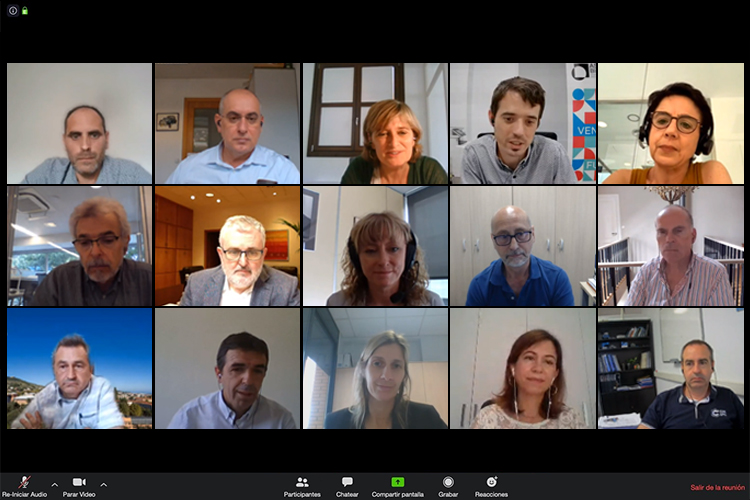Alongside several researchers and professors from the IQS School of Engineering, IQS has once again taken part in the events and seminars held as part of the Expoquimia 2021 event to showcase the essential role of the university in technology innovation and transfer in Spain.

Alongside several researchers and professors from the IQS School of Engineering, IQS has once again taken part in the events and seminars held as part of the Expoquimia 2021 event to showcase the essential role of the university in technology innovation and transfer in Spain.
In June and July, IQS participated in some of the webinars called Unprecedented Virtual Forum organized by the Barcelona Fairgrounds, a space for meetings and discussions to address the greatest challenges facing the sector today.
Specifically, in the discussion session on Agri-food and human and animal nutrition, moderated by Ion Arocena, General Director of Asebio, Dr Magda Faijes, with the Department of Bioengineering and a member of the Biological and Biotechnological Chemistry Group (GGBB), participated by presenting the project "Biotechnological platform for the production of complex oligosaccharides for infant feeding." As part of this project, the GQBB group, experts in redesigning enzymes as biocatalysts for the synthesis of oligosaccharides and glycoconjugates have developed certain components present in breast milk that do not appear in prepared or formula milk.1 The GGBB group has a biotechnology platform that combines structure-based redesign with in silico methods in addition to having developed a computational tool called Bindscan that rationally designs the specificity of enzymes with evolutionary techniques.
The Session on Technology Transfer and Collaboration between Public Research and Businesses featured participation from Dr Salvador Borrós, Director of IQS and coordinator of the Materials Engineering Group (GEMAT) at the university. In a discussion focused on the difficulties of transferring the knowledge produced at universities and research centres to society, Dr Borrós spoke about his experience as a researcher and entrepreneur as he has supervised more than 34 doctoral theses and created seven startups in the field of biomaterials throughout the course of his career. In his speech, Dr Borrós highlighted how the IQS ecosystem is unique as it has been traditionally linked with partnerships with companies, thus making it easier for the school's researchers and professors to divide their time between researching, teaching, and transferring knowledge. He also pointed out that it is essential for researchers and entrepreneurs to share their enthusiasm and the need to support technology transfer with their partners, encourage them to continue their endeavours, and create new companies.
Industrial Dialogues Session
Finally, the Industrial Dialogues Session held in July featured the presentation of some of the RIS3CAT Communities and projects that have formed part of the programme promoted by the Government of Catalonia and in which various IQS research groups have participated.
During this session, the discussion focused on additive manufacturing and plastics injection. The first speaker was Dr Guillermo Reyes, a member of the IQS Industrial Engineering Department and a researcher with the GEPI group, who made a summary of the results obtained in the TRANSPORT project within the Llavor 3D Additive Manufacturing Community. The objective of this project was to address production needs in the transport industry, specifically, obtaining lighter parts for rail transport through additive manufacturing.2 As an example, Dr Reyes showed the results obtained in lightening parts for rail transport seating manufactured through DFAM (Design For Additive Manufacturing).
During the session, Dr Andrés García, also part of the Department of Industrial Engineering and a member of the GEPI group, briefly presented the results obtained in the PLASTFUN project within the Future Industries Community. The objective of this project was to build a pilot plant to manufacture parts with advanced functional surfaces using plastic injection. Dr Garcia briefly presented the simulation tool built in this environment at IQS, which allows the replication of nanostructures and produces fluids with very specific properties in greatly reduced production times3.
1 Mireia Castejón-Vilatersana, Magda Faijes, Antoni Planas, Trasnglycosilation Activity of Engineered Bifidobacterium Lacto-N-Biosidase Mutants at Donor Subsites for Lacto-N-Tetraose Synthesis, Int. J. Mol. Sci. 2021, 22(6), 3230
2 I.Rivet, N.Dialami, M.Cervera, M.Chiumenti, G.Reyes, MA.Perez, Experimental, Computational and Dimensional Analysis of the Mechanical Performance of Fused Filament Fabricacion Parts, Polymers 2021, 13(11), 1766
3 T.Baldi-Boleda, E.Sadeghi, C.Colominas, A. Garcia-Granada, Simulation Approach for Hydrophobicity Replication via Injection Molding, Polymers 2021, 13(13), 2069










